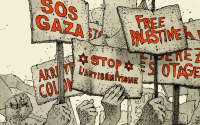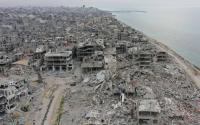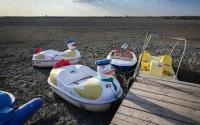14 June 2007The Independent
A sign of the times. I arrive home in Beirut from Paris, am just 20 minutes into my apartment when the windows of my office blow open with a single "crack". A tremendous explosion rolls across the Lebanese capital. Out of the house, 500 metres running down the Corniche and smoke is billowing from the Staff Sporting Club. Soldiers shouting, cops trying to keep the first reporters away, but I skulk through the ruins next to the sea with an old Lebanese photographer friend and we find ourselves in the wreckage of a tourist ghost train, all mangled tracks and carriages. "Enter at Your Risk," it says over the tunnel and on the other side is a burning car containing the corpse of Lebanon's latest assassination victim.
And not just "any" victim. The man in the smouldering vehicle is Walid Eido, a Beirut member of parliament, a former judge, much revered - anti-Syrian, of course, otherwise he would not be dead, would he? - and a supporter of Saad Hariri, son of the murdered former prime minister Rafik who was killed in an even bigger explosion on 14 February 2005, a thousand metres on the other side of my apartment. What is it about Beirut that turns this beautiful, sun-blessed city into a crematorium so quickly?
Eido was killed with his son Khaled and I saw their corpses, roasted, covered in cheap plastic bags so that Lebanon's greedy photographers could not use their last mortal remains on page one. Walid Eido's two bodyguards died with them. The "Sporting" was a hangout for Hariri's men but, as usual, this assassination must have been well planned, well co-ordinated, paid for way up front.
And what a knife into the body politic of the Hariri camp. Hariri's majority party is the reason why the government of Fouad Siniora survives, supported - heaven help them - by the Americans, abandoned by the Hizbollah who persuaded six Shia ministers to resign from the cabinet last year. Could there have been a more devastating target for the government's enemies last night?
Walid Eido represented a constituency in Beirut's tough Sunni Muslim Basta area, a populist politician who had constantly condemned Syria's "interference" and had more recently turned on Hizbollah's political action against the government. When the pro-Syrian militia group, who withstood Israel's devastating bombardment of Lebanon last summer, pitched their tents across the centre of Beirut in an attempt to bring down Siniora's government, it was Eido who referred to this as "occupation".
And what will be the reaction to this latest and most outrageous of murders? In the aftermath of the bombing, amid the ghost-train wreckage and the overturned dodgems and the ash-covered swimming pools, there was only shock. But each crisis is worse than the previous. Each assassination - of a communist politician, of a journalist, of a Christian MP - each outbreak of guerrilla violence - 61 soldiers have now been killed fighting Fatah al-Islam in the north - quick-marches Lebanon faster towards the abyss. Over the past few months, the bombs have gone off close to midnight, an industrial estate here, a Christian or Muslim shopping mall there, always too late to cause mass casualties. And that is the point, of course, to threaten rather than kill. But what if the next bomb goes off at midday rather than midnight? How many casualties then? This is the nightmare with which Lebanese live. If, in working-class Basta tonight, the crowds can be contained (by a largely Shia Muslim army), what of tomorrow?
It is to the enormous esteem of the Lebanese that they have refused to embark on another civil war despite every provocation. But the provocations have not run out. It can get much, much worse. Next to the dodgems last night lay a burned registration: 101437. Lebanese detectives duly made note of the number. But - and I tire of repeating this in my reports - not a single Lebanese assassination has been solved since 1976.






